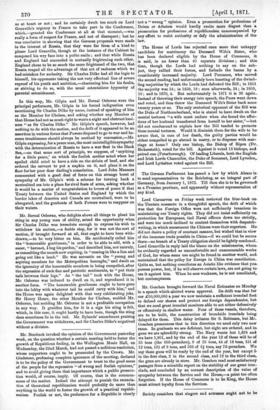Mr. Bernal Osborne, who delights above all things to plant
his sting in any young man of ability, seized the opportunity when Sir Charles Dilke was irresolute enough to express his wish to withdraw his motion,—a feeble step, for it was not the sort of motion, if brought forward at all, that ought to have been with- drawn,—to be very bitter on him. He accidentally called him the "honourable gentleman," in order to be able to add, with a sneer, "baronet, I beg his pardon," and described him, not untruly, as resembling the month now expiring, in "coming in like a lion and going out like a lamb." He was sarcastic on the "young and aspiring members for the Metropolitan boroughs," and dwelt on the ignominy of the honourable members in being compelled, after the expression of such fine and patriotic sentiments, to "put their tails between their legs." As "the tail" took with the House, Mr. Osborne was induced to dwell on it, and reproduced it in another form. "The honourable gentleman ought to have gone into the lobby with whatever tail he could carry with him," and the House was again delighted with that very exhilarating joke. Sir Henry Hoare, the other Member for Chelsea, scolded Mr. Osborne, but scolding Mr. Osborne is not a profitable occupation in any way. It gratifies him, for it is a sign his sting is felt, which, in this case, it ought hardly to have been, though the sting does sometimes lie in the tail. Mr. Rylands' amendment praising the Government was withdrawn, and Sir Charles Dilke's negatived without a division.
































 Previous page
Previous page